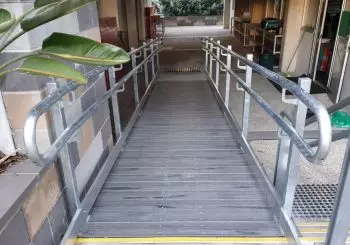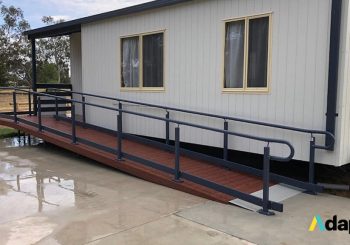Wheelchair ramps provide easy access to homes and buildings, resulting in increased independence and freedom for those who use mobility devices.
Wheelchair ramps provide easy access to homes and buildings, resulting in increased independence and freedom for those who use mobility devices. If you use a power wheelchair, with a little practice, you’ll find that in no time, you’ll be capable of manoeuvring it up and down the ramp slope with ease and confidence.
One of the most significant aspects to take into consideration while using a wheelchair ramp is safety. A ramp with an inclination more than what you’re comfortable with should be avoided at all costs. Even if you have someone to assist you, safety should always be your number one priority.
Learning To Climb a Wheelchair Ramp
Follow these tips to use your power chair over a ramp safely:
- Consider removing anything that can result in your wheelchair tipping backward, like a large backpack or a walker.
- Secure the seat belt, and see to it that the anti-tip function is operational.
- Place your chair at the base of the ramp.
- Only focus on moving forward as you start ascending. This is something you’ll get a hang off after experimentation. You can then develop a technique that’s both comfortable and effective.
Wheelchair Ramps: Descending Techniques
Keep in mind that gravity will affect your chair. This makes it essential that you proceed with caution while descending the ramp. Follow these steps:
- Ensure that your seat belt is tight and your chair centred. Slowly power up the chair and move forward.
- To stabilise your upper body, consider using a chest strap. This will effectively prevent you from leaning forward.
- Reduce the speed of the chair and come to a slow stop as soon as you approach the landing.
A Few Additional Tips for Using the Ramp Safely
- To ensure that you find your comfort level, practice over ramps with various inclines.
- Until you’re entirely capable of using the ramp on your own, get the assistance of a caregiver.
Select the Perfect Disability Ramp for Your House
Despite what many tend to believe, a wheelchair ramp is much more than a simple piece of metal, and no ramp can effectively have all the required features.
Different materials, features, lengths, and slopes are implemented while designing wheelchair ramps, and each of them has a specific purpose. These guidelines are what make ramps unique. It’s essential to determine which one’s perfect for your needs, and what criteria you need to consider while buying a wheelchair ramp.
Ramp Construction Features
While getting a new ramp installed, it’s crucial that certain aspects like the layout of your property, available space, your specific requirements, and budget are taken into consideration. Here is some information about wheelchair ramp layouts. While wood is the most common material used for ramps, aluminium is a much stronger and durable option.
It is crucial that the design, turns, and width of all ramps be perfect for ensuring that they remain efficient. Also, the angles and turns have to be wide enough to accommodate the wheelchair width while it’s being operated. Figure out the width of the wheelchair and then design the layout of the ramp; it the best way to get this aspect right.
Also, keep in mind that additional space is required for an attendant that might be assisting you. It is vital to ensure that the ramp has no sharp turns as it can result in serious accidents. Consult experts like the ones at our company before you make a final decision about the type of disability ramp you want.
We offer a wide variety of ramp layouts and options and will help you with the design, planning, and the installation of your ramp. You can call 1800 232 782 or contact Adapta through this form, and one of our representatives will contact you shortly.



